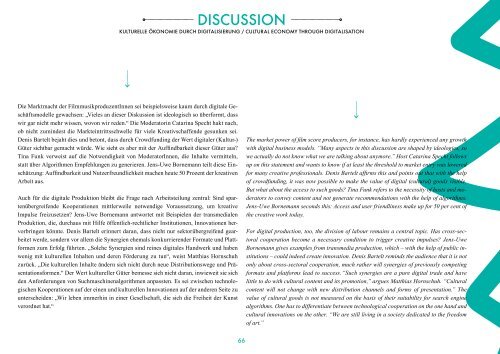DIGITAL IST KULTUR CULTURE IS DIGITAL – DIGITAL IS CULTURE
1n3RpM7
1n3RpM7
Erfolgreiche ePaper selbst erstellen
Machen Sie aus Ihren PDF Publikationen ein blätterbares Flipbook mit unserer einzigartigen Google optimierten e-Paper Software.
D<strong>IS</strong>CUSSION<br />
<strong>KULTUR</strong>ELLE ÖKONOMIE DURCH <strong>DIGITAL</strong><strong>IS</strong>IERUNG / CULTURAL ECONOMY THROUGH <strong>DIGITAL</strong><strong>IS</strong>ATION<br />
Die Marktmacht der FilmmusikproduzentInnen sei beispielsweise kaum durch digitale Geschäftsmodelle<br />
gewachsen: „Vieles an dieser Diskussion ist ideologisch so überformt, dass<br />
wir gar nicht mehr wissen, wovon wir reden.“ Die Moderatorin Catarina Specht hakt nach,<br />
ob nicht zumindest die Markteintrittsschwelle für viele Kreativschaffende gesunken sei.<br />
Denis Bartelt bejaht dies und betont, dass durch Crowdfunding der Wert digitaler (Kultur-)<br />
Güter sichtbar gemacht würde. Wie sieht es aber mit der Auffindbarkeit dieser Güter aus?<br />
Tina Funk verweist auf die Notwendigkeit von ModeratorInnen, die Inhalte vermitteln,<br />
statt über Algorithmen Empfehlungen zu generieren. Jens-Uwe Bornemann teilt diese Einschätzung:<br />
Auffindbarkeit und Nutzerfreundlichkeit machen heute 50 Prozent der kreativen<br />
Arbeit aus.<br />
Auch für die digitale Produktion bleibt die Frage nach Arbeitsteilung zentral: Sind spartenübergreifende<br />
Kooperationen mittlerweile notwendige Voraussetzung, um kreative<br />
Impulse freizusetzen? Jens-Uwe Bornemann antwortet mit Beispielen der transmedialen<br />
Produktion, die, durchaus mit Hilfe öffentlich-rechtlicher Institutionen, Innovationen hervorbringen<br />
könnte. Denis Bartelt erinnert daran, dass nicht nur sektorübergreifend gearbeitet<br />
werde, sondern vor allem die Synergien ehemals konkurrierender Formate und Plattformen<br />
zum Erfolg führten. „Solche Synergien sind reines digitales Handwerk und haben<br />
wenig mit kulturellen Inhalten und deren Förderung zu tun“, weist Matthias Hornschuh<br />
zurück. „Die kulturellen Inhalte ändern sich nicht durch neue Distributionswege und Präsentationsformen.“<br />
Der Wert kultureller Güter bemesse sich nicht daran, inwieweit sie sich<br />
den Anforderungen von Suchmaschinenalgorithmen anpassten. Es sei zwischen technologischen<br />
Kooperationen auf der einen und kulturellen Innovationen auf der anderen Seite zu<br />
unterscheiden: „Wir leben immerhin in einer Gesellschaft, die sich die Freiheit der Kunst<br />
verordnet hat.“<br />
The market power of film score producers, for instance, has hardly experienced any growth<br />
with digital business models. “Many aspects in this discussion are shaped by ideologies, so<br />
we actually do not know what we are talking about anymore.” Host Catarina Specht follows<br />
up on this statement and wants to know if at least the threshold to market entry was lowered<br />
for many creative professionals. Denis Bartelt affirms this and points out that with the help<br />
of crowdfunding, it was now possible to make the value of digital (cultural) goods visible.<br />
But what about the access to such goods? Tina Funk refers to the necessity of hosts and moderators<br />
to convey content and not generate recommendations with the help of algorithms.<br />
Jens-Uwe Bornemann seconds this: Access and user friendliness make up for 50 per cent of<br />
the creative work today.<br />
For digital production, too, the division of labour remains a central topic. Has cross-sectoral<br />
cooperation become a necessary condition to trigger creative impulses? Jens-Uwe<br />
Bornemann gives examples from transmedia production, which <strong>–</strong> with the help of public institutions<br />
<strong>–</strong> could indeed create innovation. Denis Bartelt reminds the audience that it is not<br />
only about cross-sectoral cooperation, much rather will synergies of previously competing<br />
formats and platforms lead to success. “Such synergies are a pure digital trade and have<br />
little to do with cultural content and its promotion,” argues Matthias Hornschuh. “Cultural<br />
content will not change with new distribution channels and forms of presentation.” The<br />
value of cultural goods is not measured on the basis of their suitability for search engine<br />
algorithms. One has to differentiate between technological cooperation on the one hand and<br />
cultural innovations on the other. “We are still living in a society dedicated to the freedom<br />
of art.”<br />
66


